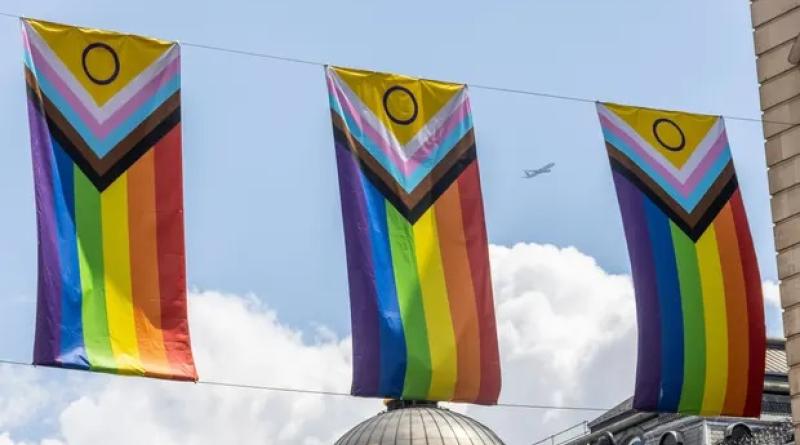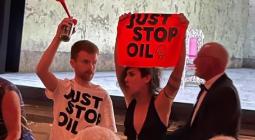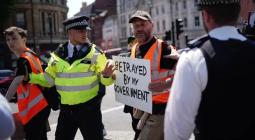Is Pride the right target for Just Stop Oil? Yes, when it’s letting our common enemy off the hook

Queer members of Just Stop Oil issued Pride in London with a set of demands this week, arguing that “the climate crisis is the biggest threat to LGBTQ+ rights, due to social collapse”. This comes after Pride faced accusations of “pinkwashing” over its decision to make United Airlines the headline sponsor of this year’s event.
Just Stop Oil is calling for transparency around which companies Pride in London accepts money from, and how these decisions are made; a statement from the organisers demanding an end to new oil and gas; and a public meeting with its volunteers about joining the fight for climate justice. Failure to meet these demands, Just Stop Oil suggested, “may or may not” result in protest action during Saturday’s event.
Pride is not alone in facing this kind of criticism: in June, the British LGBT Awards saw a number of public figures pull out of the event in protest at its partnership with Shell and BP. Rather than coming out of nowhere, Just Stop Oil’s actions are part of a larger wave of activism that aims to forge a greater connection between the LGBTQ+ movement and the struggle for climate justice. Activist group Fossil Free Pride, for example, has been steadily campaigning for Pride events to refuse partnerships with environmentally destructive companies.
I am behind Just Stop Oil’s intervention, partly because it is dramatic and a little messy – there’s a kind of supervillain campness to it issuing a public ultimatum against a ticking clock. But it would be safe to say that not everyone found it so charming. The demand inspired furious accusations of homophobia; chortling from the right about “the wokes tearing each other apart”; and the articulation of a well founded concern – at a time when homophobic and transphobic sentiments are resurgent, with an attendant increase in physical violence, is targeting an LGBTQ+ event just throwing more fuel on the fire?
I have some sympathy with this view, but protesting against a specific LGBTQ+ organisation is not the same thing as attacking the community as a whole. Following Pride in London’s racism scandal in 2021, it is hard to think of it as a cherished institution that automatically commands our loyalty.
While some people have objected to the very notion of protesting against a Pride event, there is a long history of activists doing so, often in extremely catty ways: in the late 1990s and early 2000s, in the US the Gay Shame movement would host sarcastic award ceremonies, dishing out prizes in categories such as Exploiting Our Youth, Making More Queers Homeless and Best Racist-Ass Whites-Only Space. More recently, in 2017, five queer activists were arrested after protesting against the police presence at Glasgow Pride. Regardless of how hostile the current climate may be, protesting against a Pride event is not inherently reactionary, and LGBTQ+ institutions should not be considered above critique.
In the backlash against Just Stop Oil’s announcement, one argument has cropped up repeatedly: LGBTQ+ rights and climate change are separate issues, and it’s therefore inappropriate for environmental activists to conflate the two. In other words, Just Stop Oil should stick to its movement. This idea – that LGBTQ+ rights can be neatly cordoned off from other forms of political struggle – is an enduring one, but it’s at odds with the original vision of gay liberation and the spirit of the protests Pride is intended to commemorate.
Stonewall was a riot, as the cliche goes, but rather than being a spontaneous uprising, it was driven – at least in part – by committed activists who were already involved in different movements. In the 1970s, groups such as the Gay Liberation Front and Street Transvestite Action Revolutionaries (Star) were firmly internationalist and multidimensional in their approaches, committed to opposing racism, colonialism and oppression in all its forms. By fighting for climate justice, today’s queer activists are reclaiming this inheritance.
It should go without saying that the wellbeing of LGBTQ+ people is inseparable from the climate crisis, which is coming for us all, regardless of our sexuality or gender identity. Research also suggests that marginalised members of society – particularly those who experience poverty, insecure housing and discrimination – will be disproportionately vulnerable to its effects.
It should go without saying that the wellbeing of LGBTQ+ people is inseparable from the climate crisis, which is coming for us all, regardless of our sexuality or gender identity. Research also suggests that marginalised members of society – particularly those who experience poverty, insecure housing and discrimination – will be disproportionately vulnerable to its effects.
cover photo:‘While some people have objected to the very notion of protesting against a Pride event, there is a long history of activists doing so.’ Photograph: Sinai Noor/Shutterstock





